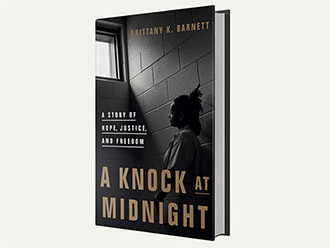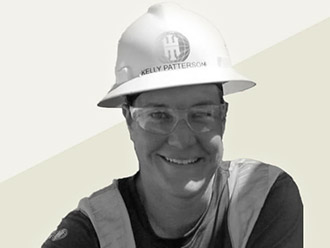In any college town, the college and the city it lives in are inextricably linked. Thriving universities can inject invaluable resources into their home cities, with skilled and knowledgeable faculty working to find solutions to the city’s challenges and talented and motivated students getting involved and finding ways to make a difference. That’s especially true for The University of Texas at Arlington and the city it calls home.
“UTA is one of the city’s most significant partners and the largest economic development engine, which creates a competitive advantage for Arlington,” says Jim Parajon, deputy city manager in Arlington and an adjunct professor in UTA’s College of Architecture, Planning, and Public Affairs. “Our partnership with UTA isn’t just important; it’s critical.”
It’s a partnership that UTA is proud to nurture, providing myriad opportunities for students, faculty, and staff to get involved and effect change. The prospects for active participation in shaping the city are widely variable, from civic engagement and grassroots advocacy to cultivating an appreciation of the arts.
“Active engagement is a hallmark of a successful city,” says Jennifer Wichmann (’99 MPA; MSW), another deputy city manager for Arlington. “It’s important for all citizens—including college students—to get involved.”
Stepping Forward
Walkable Arlington
In a bustling, enormous city like Arlington—the seventh-largest city in Texas—residents need options for getting around. A group of students has teamed up with professors, staff, Arlington residents, and community leaders to form a grassroots advocacy group, Walkable Arlington, to help make the city more pedestrian- and cyclist-friendly. The student-led movement is calling for more walkable spaces in Arlington and greater transportation options.
“With a university in the heart of a city, the ability for students and people downtown to walk to local businesses is essential,” says Wichmann. Parajon concurs: “Walkability is key to choice. If you have no choices, you become isolated and disconnected from the things that make a city great.”
Together with Arlington City Council members and Arlington citizens, Walkable Arlington advocates have walked miles of downtown-area roadways, noting problem areas and proposing possible solutions. The group has already ensured the installation of Leading Pedestrian Intervals (LPIs) at 19 signalized locations in areas downtown and around UT Arlington. LPIs give pedestrians a 3-7 second head start when entering an intersection with a corresponding green signal in the same direction of vehicle travel. They can enhance the visibility of pedestrians in the intersection and reinforce their right-of-way over turning vehicles, reducing pedestrian-vehicle collisions at intersections.
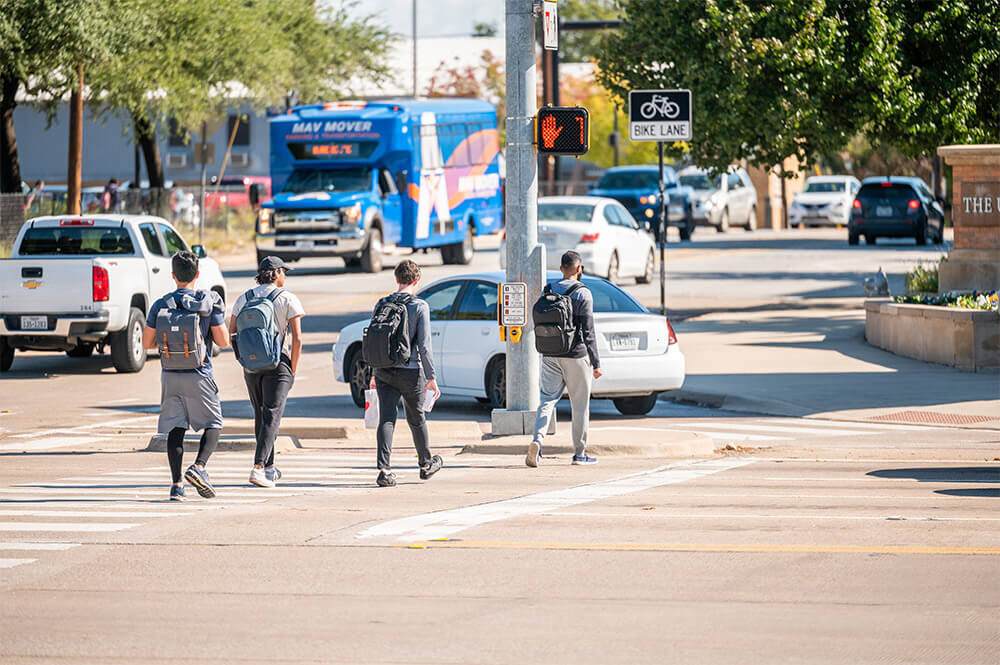
In a city as large as Arlington, it’s important for citizens to have plenty of options for getting around. Walkable Arlington seeks to make the streets more pedestrian- friendly.
The group has also spoken directly to the city council about safety and economic concerns, and several of the group’s ideas are already folded into city master plans and studies.
Corrina Sullivan, financial coordinator for Walkable Arlington and UTA political science senior, says that even though the work does not always yield instant gratification, it’s worth it.
“We have a lot of energy, and we’re in this for the long term,” says Sullivan, who was born and raised in Arlington. “I have a desire to make a difference in this area, not just for the time that I’m here, but also for the people who will come after me so it’s safer for everyone and people don’t get hurt.”
United We Stand
The Unity Council
In the wake of nationwide civic unrest after the murder of George Floyd, the city of Arlington—the eighth-most diverse city in the United States—launched the Unity Council, a 30-member group that was charged with increasing equality in Arlington through community input and by examining equity strategies. The council tabbed Jason Shelton, associate professor of anthropology and sociology and the director of the Center for African American Studies at UT Arlington, to lead as chairman.
“I’ve spent my life writing and researching, but I’ve never had the opportunity to impact the world with these ideas in a way that I can do with the Unity Council,” says Dr. Shelton. “I teach my students that you have to get involved in the world if you want to make a change. That you can’t just sit in your apartment or even just go to work. You have to do more than that if you really want to impact society.”
To that end, many UTA undergraduate and graduate anthropology students got involved with the Unity Council, pitching in to help gather community input through one-on-one interviews.
“Some of the responses that I got were heartbreaking and difficult to stomach,” says Desiree Alvarez, a graduate student. “People felt very raw, scared, and helpless—including myself—especially as we were still in the midst of a pandemic. But this felt like something that I could actually do in my city with the people directly around me.”
Many UT Arlington faculty, staff, and administrators—from enrollment services and multicultural affairs to professors of various disciplines—were also part of the Unity Council’s efforts.
“The leaders and groups involved had such passion for our community and for the work of the Unity Council,” says Troy Johnson, vice president for enrollment management at UTA. “There has been openness to hearing the realities and creativity when seeking recommendations for the future. The council engaged so many in its quest that the process itself built unity.”
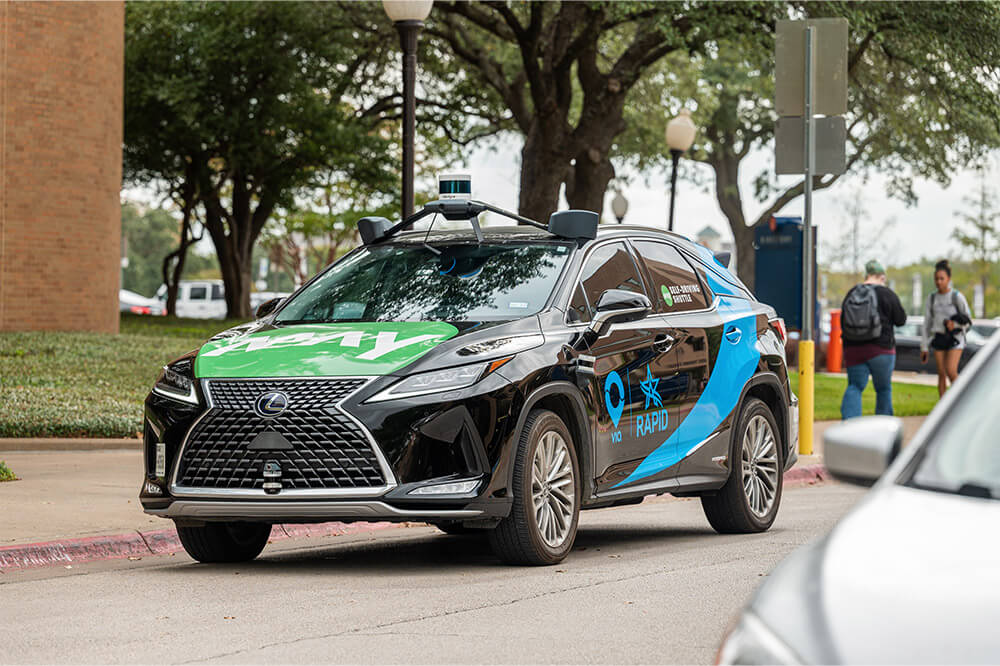
Getting Around Town
Beginning in March 2021, UTA and Arlington, along with Via and May Mobility, launched a one-year pilot program to offer a new transportation option for the nearly 10,000 students living on campus, as well as the general public. The program, called RAPID (Rideshare, Automation, and Payment Integration Demonstration), provides a unique self-driving shuttle service to students free of charge and to the general public for standard fare rates. Riders can use RAPID to reach various destinations in the program’s service area, which includes the Downtown Library, City Hall, the UTA campus, and many restaurants, offices, and businesses in the downtown area. As part of the pilot program, UTA is collecting data that will contribute to transportation blueprints for the city and the campus. UTA faculty from the colleges of Science and Engineering, as well as campus operations staff, are involved.
Altogether, the city was able to hear from over 300 residents in interviews, focus groups, and town hall meetings. Participation came from a variety of communities, including African Americans, Asian Americans, Latinos, LGBTQ+, Arlington’s youth, and religious groups. The final report included numerous statistics related to city data and summaries of interviews and focus group opinions from residents and community leaders. Totaling over 130 pages, the report also outlined 50 recommendations on how the city could improve in the following areas: health and wellness, education, housing, policing and criminal justice, and economic disparities.
Shortly after the report was completed, in March 2021, the National League of Cities selected Arlington as the winner of its 2021 Cultural Diversity Awards for the work of the Unity Council. The city was awarded the top prize in the 200,001-500,000 population category.
“This coalition is how people from different backgrounds create a vision of the community they want to live in and then come together to assert themselves,” says Shelton. “And UTA students are a part of it—directly giving back to, while influencing and building up, the city of Arlington—changing and impacting the world.”
Creative Engagement
Downtown Arlington
Management Corporation
When a 2019 economic impact study showed that in downtown Arlington, arts—including music, theater arts, and dance from UT Arlington—pumped more than $118 million a year into the economy and supported more than 1,200 jobs, community leaders recognized the burgeoning potential in the city’s arts and culture scene. In brainstorming ways to better understand what the arts do for Arlington, they naturally turned to UTA.
“It’s important for universities, especially big research universities like UTA, to be bastions of expertise that you can’t really find in other locations,” says Dan Cavanagh, interim dean of the College of Liberal Arts (COLA) and a member of the Downtown Arlington Management Corporation (DAMC). “By its very nature, that concentration of expertise and creative activity in COLA alone seeps out into the community.”
Designated as the Arlington Cultural District, downtown Arlington aims to be a place where creativity and hometown pride thrive. Within less than a two-mile radius, downtown features visual and performing arts institutions, live entertainment locales, professional athletics venues, and dining and retail establishments. The DAMC is a private nonprofit created to build alliances between businesses, residents and the city to enhance downtown arts, culture, and economic vitality.
“Here in downtown Arlington, we love the arts” says Maggie Campbell, president and CEO of the DAMC. “Clearly, the arts community is a strong and vital sector of our economy with great potential for growth and broader impact.”
The DAMC has selected interns from the University to help promote the arts scene in Arlington. UTA students have been assisting cultural arts district partners such as the Arlington Museum of Art, Theatre Arlington, and Symphony Arlington with ventures in improving web presence, brand strategies, social media, event planning, and more. The internship program is run by Katie Gosa (’18 BA, Psychology and History), who is also manager of business improvement district services and communications for the DAMC.
“The possibilities for civic engagement in the Arlington community for students are incredible,” says Cavanagh. “It’s a showcase for the amazing experiences our students are a part of and the accomplishments that they earn. Through our partnerships, we are engaged in the cutting edge of things happening in society.”
Brittany Jones, public relations senior at UTA and DAMC intern, reflects on the connection between UT Arlington and the city, noting how welcoming its leaders, citizens, and business owners are.
“UTA is downtown Arlington,” says Jones. “Both are continuously growing, and it’s eye-opening to fully experience all the moving parts, meet the people involved, and be a part of the ways we can integrate UTA and Arlington better.”
This process of working alongside the city—and integrating the time, knowledge, and skills of Mavericks into the local community—has an effect that goes beyond enriching Arlington. As Cavanagh notes, such hands-on experience can help prepare students to make a difference in the world however they choose to do so.
“As a university, we’re on a mission to study and change the world and do things that impact it in a positive way,” he says. “That takes a lot of forms, and certainly one of them is being engaged with our community partners.”
The bond between the city and its namesake University is undeniable, and the partnerships span so many areas that it would be impossible to detail them all. Mavericks have come to play a role in almost every aspect of Arlington life, from the University’s collaborations with the Arlington Police Department to in-person and virtual music programming with the popular Levitt Pavilion. Other programs and services for community engagement include the campus serving as a place for residents to vote and even receive COVID-19 testing and vaccinations.
With all the opportunities to get involved, students learn far beyond the nuts and bolts of their desired fields of study. Through service-learning projects, organized volunteer events for area nonprofits and community gardens, and much more, students develop a passion for community outreach while discovering all the versatile ways that can be accomplished.
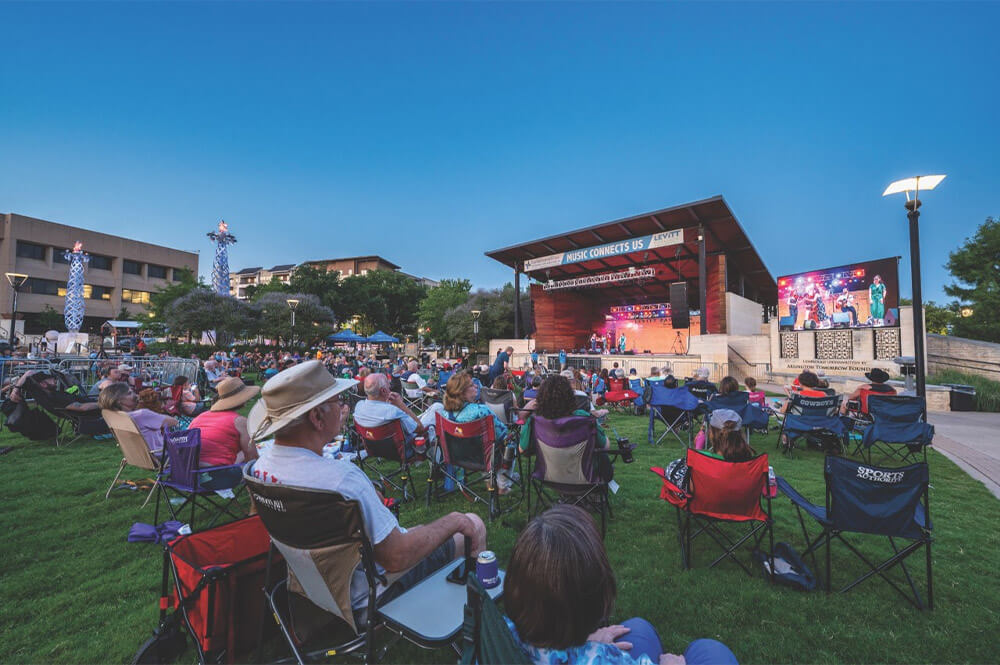
When COVID-19 prohibited large in-person concerts, UTA partnered with the Levitt Pavilion to bring free educational music presentations to a virtual audience.
As Mavericks continue to pursue the best for the city—their community, their streets, and their neighbors—they create an impact that ripples out across the globe. Because wherever Mavericks go, and whatever Mavericks do, they take that drive to make a difference with them.
Arlington City Manager and former president of the UTA Alumni Association, Trey Yelverton (’88 BA, Political Science and Public Administration) credits UTA with elevating the city with each success story.
“UTA is one of the most distinguished research universities in both Texas and the United States,” he says. “Arlington is truly fortunate to work alongside such a committed community partner, whose faculty, student body, and alumni actively contribute to the rich diverseness, economic strength, and boundless opportunity that make our city such an attractive place to live, work, and learn. We appreciate the University’s leadership, vision, and willingness to join our efforts at creating a better Arlington for all.” uta

